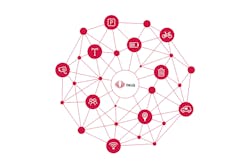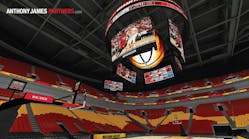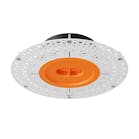Piscataway, NJ, USA– July 12, 2021 – The TALQ Consortium, which developed the Smart City Protocol, a global interface standard for smart city device networks, is today making available the detailed TALQ protocol on GitHub. This allows software developers as well as project planners, consultants and city representatives around the world to use and benefit from the TALQ knowhow developed over the past nine years. The main drivers for this are to help cities understand better why they should include the TALQ standard as a request in public tenders across a range of smart city applications and to underwrite investments in interoperable and future-proof systems.
The key to a successful international standard is certainly that it should be technically sound with market-leading functionality. But another, maybe even more important, factor is to share the solution with many users and let them understand and experience for themselves the advantages of the approach. This is exactly the way the TALQ Consortium has decided to go in July 2021. After nine years developing a modern, functional and flexible software protocol to enable interoperability of smart street lighting systems and other smart city applications from multiple vendors, the consortium is pleased to share with the smart city community the detail of the TALQ OpenAPI Specification in the public domain.
From today, the TALQ protocol (both the data model and API definitions) can be found openly and free-of-charge on GitHub. This provides cities and other municipal authorities, commentators, consultants and potential members with the opportunity to view the details of the specification and to understand the advantages it brings.
“Personally, I believe that this is a very exciting time for the consortium as membership continues to grow, new TALQ certifications are confirmed nearly every month and TALQ branches further out into smart cities. We are confident that greater exposure of the standard will drive yet more progress in the industry.” reports Rui Peixe, Chairman TALQ Technical Workgroup.
The benefits of OpenAPI
Making the specification public allows manufacturers of Central Management Software (CMS) and Outdoor Device Networks (ODN, so called ‘Gateways’) to consider integrating the protocol into their own systems and to become interoperable with the solutions of other vendors.
The benefit to the smart city community is that there will be even more awareness of the specification – both vendors and cities – allowing them to profit from decades of Smart Outdoor Lighting and Smart City experience and prepare future-proof solutions, whilst at the same time opening the specification up to public scrutiny.
The TALQ OpenAPI definition provides developers with access to an extensive set of tools. Widely available documentation generation tools can be used to display the API, and code generation tools can create servers and clients in various programming languages. A wide range of testing and other tools is also available, all of which dramatically reduces the development effort for system manufacturers.
How to become TALQ-compliant
Compliance with the specification will remain restricted to member companies, who will retain access to the carefully designed Test Suite with which they can test their systems internally until they are ready for official TALQ certification. These test tools provide valuable diagnostic information to accelerate the integration of the TALQ OpenAPI Specification.
The consortium provides other valuable resources to members, including technical videos, an exclusive member communication platform, a clear and updated view of the specification roadmap through a web application, technical support for individual members as well as regular virtual and live plug fests to test systems for interoperability against systems from other member companies.
Furthermore, certification of TALQ-compliant systems and the inclusion of a product in the official list of certified products is reserved for TALQ members only. Regular Members can certify as many products as often as they wish without additional charge; Associate Members pay a small fee per certification of each product. Members can request certification by passing a complete set of test cases with the Test Tool and sending the results to the TALQ Certification Work Group. This makes the certification process agile and quick.
About the TALQ Consortium:
Founded in 2012, the TALQ Consortium has established a globally accepted standard for management software interfaces to control and monitor heterogeneous smart city applications. The TALQ Smart City Protocol is a specification for information exchange, suitable for implementation in various products and systems. This way interoperability between Central Management Software (CMS) and Outdoor Device Networks (ODN) from different vendors will be enabled, such that a single CMS can control different ODNs in different parts of a city or region.
TALQ is an open industry consortium currently consisting of about 50 member companies.
For more information visit www.talq-consortium.org
Certified TALQ-Compliant Products (TALQ Version 2):
- Central Management Software (CMS):
- CityLinx from BeeZeeLinx, France
- City Vision from Capelon, Sweden
- LightingGale from CIMCON, USA
- StreetMan from Dhyan, USA
- inteliLIGHT CMS from Flashnet, Romania
- SLV CMS from Itron, USA
- SmartLinx from LED Roadway Lighting, Canada
- LuxSave Streetlight CMS from LuxSave, Sweden
- PE Smart CMS Neptune from Paradox Engineering, Switzerland
- EXEDRA from Schréder, Belgium
- CityMESH CMS from SICOM, Chile
- PLANet from Telensa, United Kingdom
- CityManager from TVILIGHT, the Netherlands
- Smart Firefly from Uvax, Spain
Outdoor Device Network (ODN) / Gateway:
Contact:
Eva Jubitz
TALQ Communications Consultant





